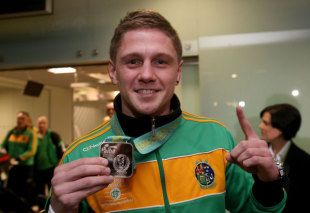Anthony Fowler had stitches in a cut eye, a hand swollen to twice its size and glue held together three cuts on his head but he still wanted to fight in last weekend's World Amateur Boxing championships in Kazakhstan.
"I tried to make out there was nothing wrong with me," Fowler said at the end of the historic event.
The GB team doctors and coaches pulled him to one side and explained the full wider picture and reluctantly the Liverpool middleweight was withdrawn from the relentlessly difficult tournament. There were no tears, just a rock-hard desire to go further the next time.
"It has made me more determined to get on the podium at the very top," continued Fowler. "The bronze medal at this tournament is a great achievement, but I want more; I want the gold." Fowler beat seeded boxers on his way to the semi-final and at the next major tournament he will be one of the seeded boxers, one of the men the rest want to avoid.
The event in Almaty was the first major amateur boxing tournament to take place without head guards since the World championships in Moscow in 1989. The head guards, which were introduced at the LA Olympics in 1984, are gone forever and the boxers seem to be divided about the benefits.

"It helps with vision, there is no doubt and I like it," admitted Fowler. "But, I don't think that I would have had the cuts if I had been wearing a head guard. A lot of boxers were cut and some had their tournament ruined because they were not wearing a head guard."
Perhaps Belfast's brilliant Paddy Barnes summed it up perfectly and captured just how hard it is to win a major amateur title: "I like fighting without head guards, but fighting six times in ten days is impossible." Barnes, a medal winner in all major events, won three times before losing a tight decision in the quarter finals.
Sam Maxwell, from the Salisbury club in Liverpool, was shockingly disqualified for an alleged headbutt that opened a cut above his opponent's eye. It was an accidental butt, one of many cuts caused by head clashes, and it meant that his opponent could not advance and, because he was disqualified, neither could a heart-broken Maxwell. Several other British and Irish boxers suffered cuts and grazes that they would not have suffered had they been wearing head guards. However, the action without the head guards looked terrific and made the boxers much more identifiable. Some of the finals were TV gold.
In Almaty, 31 boxers from Britain and Ireland tried to win a medal and just four returned with medals, including Ireland's Jason Quigley who lost in the middleweight final to the man that Fowler was meant to fight in the semi-final. "I know that without all of the injuries I could have won the gold," added Fowler.
It needs to also be remembered that both the GB and the Irish teams have been devastated by defections to the pro game since last year's glorious Olympics.
Gold medal winners Anthony Joshua and Luke Campbell are now busy pros, Ireland's silver medal winner John Joe Nevin is waiting for his debut and bronze medallist at middleweight Anthony Ogogo has a deal with Golden Boy in the USA. They were all veterans of world and European events, all served the toughest of sporting apprenticeships.
"I wish that they had kept the head guards," said Ogogo at the weekend. "I like there to be a clean line between the pro game and the amateur sport; that is what head guards did."
Ogogo is right but moving forward to Rio and beyond it is clear that the two codes will move ever closer, the line constantly being blurred until one day the Olympic boxing event will no longer be about the best amateur boxer in the world - it will simply be about the best boxer in the world. The revolution started in Almaty.
© ESPN Sports Media Ltd
 Steve Bunce has been ringside in Las Vegas over 50 times, he has been at five Olympics and has been writing about boxing for over 25 years for a variety of national newspapers in Britain, including four which folded! It is possible that his face and voice have appeared on over 60 channels worldwide in a variety of languages - his first novel The Fixer was published in 2010 to no acclaim; amazingly it has been shortlisted for Sports Book of the Year.
Steve Bunce has been ringside in Las Vegas over 50 times, he has been at five Olympics and has been writing about boxing for over 25 years for a variety of national newspapers in Britain, including four which folded! It is possible that his face and voice have appeared on over 60 channels worldwide in a variety of languages - his first novel The Fixer was published in 2010 to no acclaim; amazingly it has been shortlisted for Sports Book of the Year.

